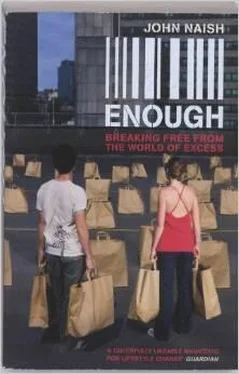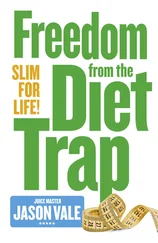While your happiness is mostly influenced by your genes, it’s also slightly influenced by childhood experiences. However, after the age of 25, there are hardly ever major changes in a person’s personality, habits or attitude.
In fact, studies have shown that this is even true after life-changing events. For example, people who win the lottery, as well as those who lose legs in freak accidents, report the same degree of happiness one year after the respective incident than before!
Although we are expected to be happy and fulfilled all the time, we have to accept the fact that this is simply not possible.
Never-ending economic growth and wealth are mere fairy tales.
We’ve been told for decades that the solution to all the world’s problems lies in economic growth. Only now, however, have we begun to see just how far this is from the truth:
In the early twentieth century, the iconic economist John Maynard put forth the idea that economic growth would help to end starvation and allow everybody to satisfy their basic needs. Since the 1940s political leaders have used this line of thinking by pursuing a policy of continued economic growth.
But then, in 1970, the influential think tank The Club of Rome published a book that grabbed international attention: it demonstrated that the earth’s ecosystem was unable to cope with our rapidly growing population and our subsequent need for more resources.
They concluded that, due to the fact that the Earth’s resources are limited, infinite economic growth is impossible.
A logical consequence of this must be a shift in thinking – from focusing on infinite growth to developing sustainable ways of using the planet’s resources. Of course, this is easier said than done:
Firstly, our global economic system is based on the ideology of economic growth. Consequently, if we all consumed less, the economic system would collapse. Despite its environmental consequences, businesses continue spending enormous resources to encourage people to consumemore, not less.
Secondly, to make meaningful change, we would have to motivate changes in behavior in huge sections of the population in order to alter social norms.
Look at the stock market as an example: when prices for a certain stock rise, the demand for it likewise increases – despite all common economic wisdom that says we should buy when the price is low.
We depart from this wisdom because we believe that what the majority of people do or believe is right, a phenomenon scientists call herd behavior. As long as the majority of people don’t change their attitude towards consumption, it’s unlikely that we’ll make much progress in changing our dangerous habits.
Up to this point, we’ve explored the dangers of our continued search for “more.” Our final blinks will offer some advice on what to do about it.
Unlike material possessions, there are some nonmaterial things that we really can’t ever get enough of.
So far, we’ve seen numerous reasons why the attitude that “more is better” is so dangerous. However, this applies mostly to material goods. There arenonmaterial things that we really can never get too much of!
For example, we can never get too much gratitude or generosity. In fact, both of these things improve our lives!
Studies show that people who note the things they are thankful for in their diaries have both higher levels of optimism and energy as well as healthier hearts.
Studies on generosity also show that donating money activates the same brain regions as receiving money or meeting friends. So, by giving something to others, you indirectly increase your own happiness.
Another thing that we can never get enough of is connectedness, i.e., our connections to and communication with others. In fact, several studies have demonstrated that the happiest people are those who spend the most time socializing.
Indeed, stable relationships – whether they’re with friends or a higher power – make people more content, and might even increase their longevity.
One way we can increase our awareness of these nonmaterial things is by keeping our focus on the present, rather than on the past or future.
Take the “Ladder of Life” study as an example, which asked people each year since 1964 how they evaluated their current life situation, their situation five years in the past and their situation five years in the future:
It became clear that people always considered their past situation worse than they had when they were actually experiencing them. Moreover, they always considered their future situations would be better than they actually ended up being.
From this data, scientists concluded that, while we always have high expectations for the future, they hardly ever come true.
In order to change our culture of excess, we need to tackle some taboos.
As you’ve seen in our previous blinks, we can’t continue a lifestyle of excess without serious consequences for both humanity and the planet we live on.
However, before we can even discuss any alternatives to our current culture of excess, we first need to understand the inadequacy of the assumptions that underpin that culture:
We assume, for instance, that there’s no alternative to the pursuit of continuous economic growth under capitalism. But why should we believe that a system that has failed to bring prosperity to everyone and in fact increases inequality should be our ultimate truth? Wouldn’t it be better to invent new ways of organizing society and economy?
Then there are major taboos, such as population control. But we need to think about how we’ll handle the growing human population, as well as what we can do to slow this process down.
Finally, we grow up with a materialist paradigm that tells us to value material possessions over spiritual or intellectual enrichment. However, as we’ve seen in these blinks, we should be doing the exact opposite!
Only once we tackle these assumptions can we begin to implement the idea of enoughness, i.e., abandoning our constant striving for more information, stuff, happiness and options, and instead cherishing what we have.
We must understand that “good” is sometimes good enough, and that achieving perfection in every aspect of our lives is neither realistic nor desirable.
This transformation, however, can’t be dictated from above; it has to start with us as individuals.
One way to initiate this change is to lead by example and thus inspire others to adopt the same idea of enoughness. You don’t have to completely revamp your entire lifestyle – sometimes even small changes and more reflection on personal decisions can make a significant difference in your life.
While it won’t be easy, it’s absolutely necessary to start rethinking our lifestyle and changing our behavior in a way that aligns with the concept of enoughness.
The key message in this book:
We live in a world of excess: we’re overworked, overfed, we buy too much junk and believe that the “grass is always greener on the other side.” As a result of this excess, we’ve become mentally and physically unhealthy and severely damage the environment. We can only escape this vicious circle by realizing that “more” is not a solution to our problems, but rather their source.
Suggested further reading: How Much is Enough? by Robert Skidelsky and Edward Skidelsky
How Much is Enough? sets out to critically inform the reader about the moral, historical and economical backgrounds of modern day capitalism, its obsession with accumulating more and more, and its consequences. It also vigorously outlines an ethical alternative to this lifestyle, in which our obsession with “more” is replaced with “the good life.”












